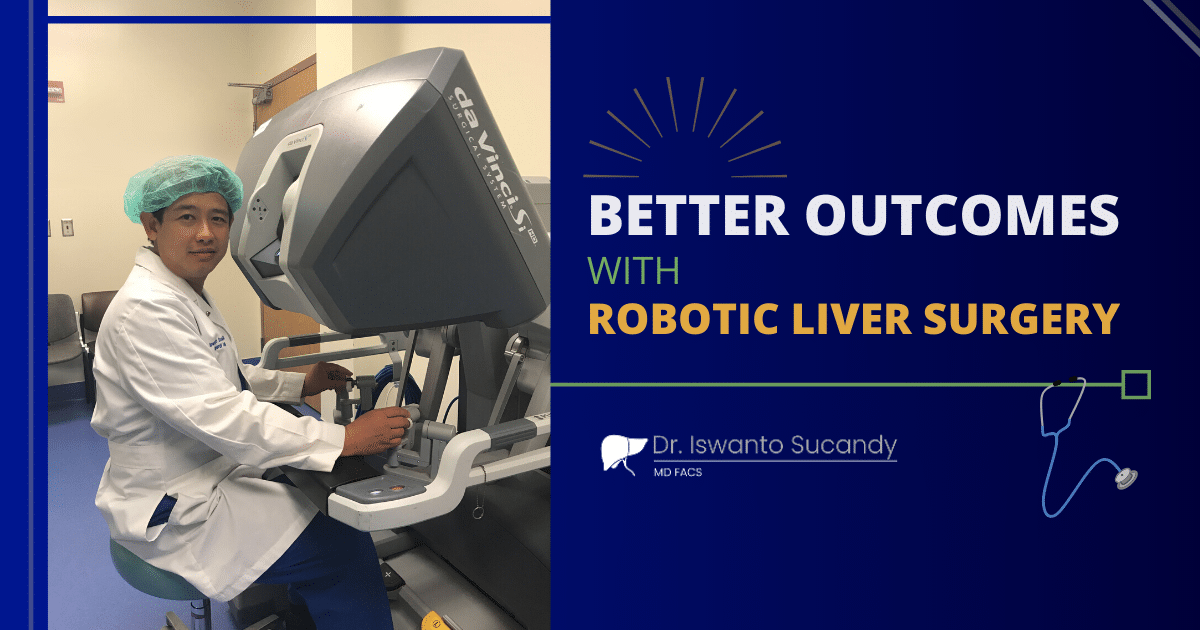
Better Outcomes With Minimally Invasive Robotic Liver Surgery
Many patients with liver tumor face new challenges of understanding different treatment options for their disease. For most, having the diagnosis of liver tumor is already very stressful and anxiety-producing. Liver tumor is a growth within the liver that can be benign or malignant. Malignant liver tumor can originate from within the liver (primary liver cancer) or outside the liver (metastatic liver cancer from other organs such as pancreas, colon, rectum, extremities, etc). Malignant liver tumors need to be removed in order to achieve long-term survival. In fact, liver resection is the only way to achieve cure. Chemotherapy or radiation can be used in conjunction to liver resection, however without surgery, cure is essentially impossible.
Traditionally, liver surgery is done through a large open incision, in order to access the liver. Majority of liver cancer centers in the United States are still predominantly utilizing this method. Since the early 1990s, minimally invasive laparoscopic liver resection began to emerge as an alternative method to open operation. Due to the inherent limitations of laparoscopic operation, robotic liver surgery was introduced with goal of improving outcomes.
Minimally invasive robotic liver surgery requires specialized training in minimally invasive technique. “Not all liver surgeons are trained to do this”, said Dr. Sucandy. They need to be fluent in open liver surgery first before attempting the minimally invasive method. It has also been known that high volume centers produce lower complications when compared with low volume centers that only perform less than 5 liver operations per year. Therefore, it is important for the patients to ask their liver surgeon or liver specialist about number of cases performed per year and the overall outcomes. These are very fair questions and the patients should not be shy or afraid to ask. This is a daily discussion that we have in our liver cancer center/program in Tampa.
While advantages of minimally invasive liver surgery have been proven through a randomized clinical trial, we are still seeing many patients on social media or internet who are uneducated about their decisions. Many patients on Facebook still think that open liver operation is always better and cleaner since the surgeons “can see everything and get their hands in there”. This understanding is not necessarily correct. They are inaccurate ! When the minimally invasive liver surgery is performed by an expert liver surgeon or liver specialist, the outcomes are actually better, when compared to the open liver surgery.
A published study from our liver cancer program found that our postoperative outcomes are significantly superior when compared to the National bench mark [1]. For robotic left hepatectomy (liver resection), our overall complication rate is 7%, much lower than the reported National standard of 21%. For robotic right hepatectomy, our overall complication rate is 13%, also much lower than the National data of 28%. While most liver resection requires 7-10 days for in-hospital recovery, our length of hospital stay after robotic liver resection is only 2-5 days. When the patients need further systemic chemotherapy after the liver resection, this can be restarted a lot sooner (4 weeks versus 8 weeks). These are remarkable differences, which bring benefits to our patients in Tampa Bay Area.
When compared to the laparoscopic liver resection, conversion rate (the need to create a large incision during the operation) is significantly lower with the robotic liver resection. In our hands, the conversion rate is only 0.5%, while most laparoscopic liver resection series have reported 10-30% conversion rate. The salutary benefit of robotic liver resection also translates into robotic gallbladder cancer resection, robotic extrahepatic biliary cancer resection, laparoscopic liver cyst unroofing, robotic bile duct leak repair, and robotic Klatskin tumor resection. Dr. Sucandy as our Tampa liver doctor will explain to you about different kinds of liver operation for each liver or bile duct cancers. Our Tampa liver specialist doctors want the best possible outcomes for you and your family, because we are fully committed to this endeavor.
- Sucandy I, Wecowski J, Schlosser S, et al. Institutional Experience of Robotic Liver Resection: Outcome Comparison With NSQIP Data. Am Surg. 2020 Mar 1;86(3):e156-e158.


